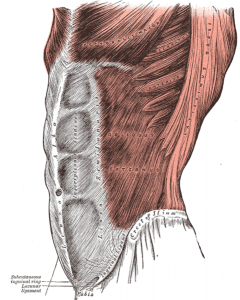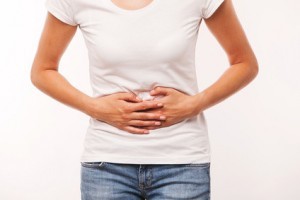Abdominal Muscle Pain, Strain and Spasm (Cramps)
Abdominal pain is one of the most common complaints seen by doctors, and we all experience it at some point in life. For some people it is a regular occurrence and can affect their quality of life. Most of the time we tend to think that the pain is arising from the organs within the abdominal cavity. However, abdominal pain may be due to the surface structures like the abdominal muscles which lie just underneath the skin.
The Abdominal Muscles
There are four main abdominal muscles of the abdominal wall that fulfill a host of functions. These muscles are the:
- External oblique muscle
- Internal oblique muscle
- Rectus abdominis muscle
- Transverse abdominis muscle
A fifth muscle known as the pyramidalis muscle lies just in front of the rectus abdominis muscle and is much smaller than the other muscles. The pyramidalis muscle lies in the lower abdomen and does not extend all the way across the abdomen from the pelvis to the rib cage.
The main abdominal muscles are flat sheets of muscles. Unlike most other cavities it does not lie against bone and therefore has to provide much of the necessary physical support on its own alongside the skin, subcutaneous fat and underlying connective tissue.
Not only does it act to stabilize and move the torso, it also has to contain the abdominal organs within. With the abdominal cavity being quite tightly packed with various organs, the abdominal muscle have to constantly withstand the internal pressure.
Abdominal Muscle Pain
Muscle pain is known as myalgia. It can occur for a number of reasons with trauma, strain and spasm being among the more common causes. Strain and spasm are discussed separately below. Trauma occurs with blunt or sharp force trauma, like a blow or penetrating injury. Bruising and tearing of the muscle may occur depending on the nature and severity of the trauma.
Abdominal muscle pain must not be confused with abdominal pain due to intestinal muscle pains. While abdominal muscle problems are a cause of abdominal pain, the muscles in the intestinal walls are different. Abdominal muscles are skeletal muscles that are under voluntary control, whereas the intestinal or bowel wall muscles are smooth muscles that are not under voluntary control. These intestinal muscles are tiny and are often the cause of abdominal cramps.
Abdominal Muscle Strain
Muscle strain is very common. It occurs with overuse or very strenuous activity. The abdominal muscles is responsible for several different movements, such as rotation of the torso, raising and lowering the torso when sitting up or lying down, as well as stabilizing the torso during walking and running. Any excess of these movements that is uncharacteristic for a person’s normal physical condition can therefore strain the muscles.
Strain also refers to the tendons, which attach the muscles to the bone or fix it to other stable points. The tendons, like the muscle are also prone to overuse. When these tendons become inflamed, it is referred to as tendinitis. Although uncommon for the abdominal muscles, it is possible for a muscle or tendon to tear either partially or completely with excessive force. This is very painful.
Abdominal Muscle Spasm
A spasm occurs when a portion of muscle contracts tightly for a prolonged period of time. The section of muscle becomes “locked” in a state of contraction and does not relax with the rest of the muscle. It is also referred to as a cramp. These contractions are involuntary and usually arise with strenuous activity although it can sometimes suddenly arise on its own even at rest.
Abdominal muscle spasms are fairly common and are often ignored as a cause of abdominal pain. The spasm may not always be easily palpable as a ‘knot’ as is the case with other muscles lying against bone. Spasms will eventually subside on their own but can last for hours, days and sometimes even weeks. The affected area of the muscle is tender with firm pressure and pain may radiate to adjacent sections of the abdominal wall.
Causes of Abdominal Muscle Problems
Pain, strain and spasm of the abdominal muscles can occur for various reasons, some of which have already been discussed. However, other reasons why these muscle problems may arise are not always obvious.
- Overuse of muscles
- Strenuous physical activity
- Trauma to the abdominal wall like a blow or penetrating injury
- Constipation with excessive straining to pass stool
- Increased intra-abdominal pressure
- Pregnancy due to the growing uterus
- Surgery to the abdomen
- Abdominal hernia
- Excessive coughing or vomiting
Although there may be some degree of abdominal muscle pain with menstrual cramps, usually the cramping in these cases arises from the uterus. There are various other muscle conditions that can affect the abdominal muscles, such as fibromyalgia and degenerative neuromuscular diseases. However, these conditions are not as common as the causes mentioned above.
Treatment and Remedies
The treatment for abdominal muscle problems needs to be directed at the underlying cause. Anti-inflammatory drugs and muscle relaxants may sometimes be used, alongside physical therapy.
- Remove any tight clothing, especially waist belts that have been fastened tightly. Even tight fitting underwear can be worsen the pain. Corsets which are sometimes worn for a slimmer figure or as way of tensing the abdominal muscles should be avoided altogether.
- Lie flat on the back and not on either side. Elevate the head and upper torso slightly if coughing and vomiting are a problem. Lying on the side may be preferable if vomiting is an issue.
- Apply an ice pack on the area of the abdomen that may have been recently injured or strain. This can be done for 24 to 48 hours, after which heat therapy may then be preferable.
- Use your hands to support you when sitting up. Try not to use your abdominal muscles entirely for these types of movements.
- Avoid strenuous physical activity. While doing abdominal exercises like ab crunches should obviously be avoided, other activities like excessive walking, bending over and twisting movements of the torso can also strain the abdominal muscles. Walk slowly when necessary and do not run until the muscle problem eases.








